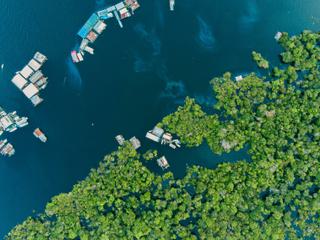The global climate transition must be rooted in local context and respond to community needs. Climate Arc’s goal of scaling up the financing of the green transitions needed to meet global ambitions can only succeed by empowering local organizations, to build bridges and work together globally.
To this end, Climate Arc (Arc) initiated the ‘Global Conversation Tour’ in 2023 to better understand the specific needs of countries grappling with the challenge of financing their climate targets. The tour set out to engage with local climate leaders and financial decision-makers; exchanging ideas and helping shape strategic interventions tailored to their unique regional challenges.

Arc has conducted workshops in Brazil, Singapore, Indonesia and South Africa, as well as holding bilateral conversations in Japan, the United States and Europe. Through these discussions, we’ve surfaced common challenges and, critically, regional and national nuances. The outcomes of these conversations have fed into Arc’s regional strategy and foundational plans which led to setting up the Climate Finance Hub Brazil.
Brazil has made progress in socio-environmental regulation for banks, and companies need to be prepared. The financial system must act as a facilitator of the net zero route.
Launched in October 2024 at a dedicated event kindly hosted by ANBIMA in São Paulo, the Climate Finance Hub Brazil is the first coalition to be formed within this global network.
Created in partnership between Arc, Instituto Clima e Sociedade (iCS), ITAUSA, the Federal University of Rio de Janeiro (UFRJ), Cooperaclima, and the Brazilian Foundation for Sustainable Development (FBDS), the ‘Hub’ is set up to upskill a diverse group of local people by producing in-depth analyses of companies' transitions towards climate goals. These insights will play a vital role in facilitating the financing of climate transitions in Brazil.
The Hub operates as an independent entity that Arc is proud to partner with and fund. The work of the Hub represents an integral intersection of Arc’s strategic pillars and approach to empower local communities to accelerate the financing of climate transitions.

The Climate Finance Hub has the potential to identify sectors that are still in development in their climate transition journey and help formulate public policies that promote significant progress, including for small and medium-sized companies.
Pathways
For the Brazilian transition to meet climate goals it needs to be anchored in and benchmarked to local dynamics as well as global frameworks. The Hub will initially incorporate leading global assessment frameworks of different sectoral transition pathways before moving into the development of Brazil-specific benchmarks against which the same companies will be assessed.
Hub partner, UFRJ, will take a lead on this localized pathway work and address the methodological development for assessing the energy and agricultural impacts of Brazilian companies.
Analysis
Assessment of individual Brazilian companies will start with Electric Utilities, Heavy Industry, and Oil & Gas, growing to 30 companies by the end of 2024.
The collected data and analysis will be made globally and publicly available on TransitionArc – making Brazilian corporate transitions more visible and actionable for financial institutions, policymakers, regulators, and the broader climate action community.
The Hub seeks to provide methodologies and tools to develop climate transition strategies in a clearer and more objective manner.
Capacity
The Hub’s primary intention is to build human capacity locally, thereby empowering local decision making. The Hub has already hired a team of five senior and six junior analysts from diverse backgrounds and across Brazil. The team’s senior analysts have extensive research experience, many with PhDs, while the junior analysts are recent graduates with environmental and scientific backgrounds. This blend of experience and fresh perspectives is critical in generating a pipeline of local experts who will not only provide critical insight into Brazil’s transition but will also be encouraged to develop a career in climate finance after completing their training in the Hub.
Analysts undertook an 8–10-week Climate Transition Analysis Training led by Arc and the Brazil Hub, covering climate science, regulations, decarbonization pathways, GHG Accounting, Life Cycle Assessment, and the ACT framework.

What’s next?
With all eyes on Brazil for COP30, Arc will work closely with the Climate Finance Hub Brazil to generate the best available local transition analysis to advance progress.
With our partnerships, we look forward to showing how Brazil can transition successfully to meet climate goals by empowering private sector actions and upskilling local people who will be equipped to drive transition-aligned financing decisions that are right for the Brazilian context.
Arc will also continue to develop similar upskilling programs in other parts of the world. We believe connecting climate transition hotspots like Brazil with other markets facing similar dynamics will create a powerful network of climate finance leaders whose knowledge and experience can have a much-needed ‘multiplier effect’ to drive action.
It is time to work together. Our Global Conversation Tour taught us that we all face similar challenges, but that these can only be solved locally. We believe dynamic collaboration, driving tangible outputs that empower local decision makers, is exactly what we need to focus on. We are delighted to support the launch of Climate Finance Hub Brazil and look forward to expanding its impact by further strengthening our partnerships globally.

Keen to hear more?
For updates, subscribe to our newsletter below.



